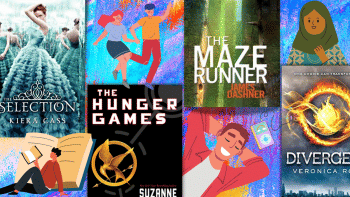‘The Hunger Games’ and the danger of desensitisation to violence

While The Ballad of Songbirds and Snakes (2023) will be returning to the world of Panem, the film will have significant differences from the original The Hunger Games movie quartet. The upcoming prequel, based on Suzanne Collins' 2020 book of the same name, is directed by Francis Lawrence, who also helmed the last three Hunger Games movies. It is set 64 years before the first film's events, following a young Coriolanus Snow's (Tom Blyth) rise to power.
Snow is a mentor during the 10th annual Hunger Games, where he is chosen to oversee one of the tributes. He's disappointed to find his mentee is Lucy Gray Baird (Rachel Zegler), a girl from the impoverished District 12. Over six decades later, Snow would be president with a war brewing from the opposition led by Katniss Everdeen, the female tribute from that same district.
By watching and celebrating the Hunger Games, citizens of the Capitol in the original series indicate that the tributes are beneath them and undeserving of the same respect and security. Despite their exaggerated displays of emotions throughout the course of the Games, such as laughing and weeping during the interviews with Caesar Flickerman, the Capitol citizens do nothing to act on these feelings and instead, enjoy the suffering on their screens. They demand real pain and death as entertainment, even though they lack authentic suffering in their own lives.
In the books, the Games are presented as a major spectacle, complete with extravagant costumes, makeup, and hairstyles for the tributes, as well as an assortment of high-tech gadgets and weapons to dissuade people from scrutinising their true motives. The movies mirrored this approach through exclusive marketing strategies such as Capitol Couture. By creating a sense of scarcity around the limited edition clothing line, the films generated excitement and anticipation among fans who wanted to own a piece of the Hunger Games franchise. But what are we saying if we buy these clothes—aren't we buying into the very thing that Collins' books try to warn us against?
As I read the prequel, I was horrified to find myself excited about the Games and comparing them to those of the original trilogy.
But in this story, the Capitol has not yet become a hub of wasteful decadence, as it is fresh from the destruction of the First Rebellion. The Games take place in a crumbling arena of indeterminable size, once used for military parades, and further damaged by an unsuspected bomb attack—more akin to the Roman gladiator games that inspired Collins than the futuristic environment seen in the original trilogy. They also lack the bloodthirsty audience from The Hunger Games. Not that many people enjoy watching the Games yet, even within the Capitol. They don't doubt their necessity—the war between districts and Capitol is only 10 years gone, and everyone remembers the deprivation and the horror of the violence and is eager for it to be avenged on their enemies—but they find the Games dull. In making the Games unglamorous, Collins challenges the audience to reflect on how they view violence in entertainment.
What ultimately separates the prequel from the original series is that it heavily focuses on the politics and scandals that eventually turned the Games into what they became.
Ballad shows how Snow becomes the sadistic leader from The Hunger Games and the lengths he was willing to go to politically secure himself as a powerful individual in Panem.
Here, instead of being thrust into the arena by a cruel Capitol with Katniss, we become spectators, watching children being forced to fight each other to the death in a rudimentary death match. In the same vein as the book, the film too must address how looking over the shoulder of mentor Snow makes us more complicit in the Games, ensuring their seamless execution. Collins forces the audience to think about what they would do, not to make it out alive, but if given the control.
The Hunger Games franchise's exploration of themes such as power, survival, and social injustice have captured the imagination of millions around the world. However, a significant part of its appeal lies in its depiction of violence, particularly the brutal and graphic nature of the titular games. While this violence is necessary to convey the story's messages and themes, it also raises concerns about the ethical implications of using violence as entertainment, especially in a world where real-life violence and suffering are all too common.
While the story sheds light on critical social and political issues, its graphic and stylised portrayal of violence could desensitise the audience to real-life violence and glamorise the very behaviour that it seeks to condemn. The franchise highlights the importance of using entertainment to educate and inspire, while also being mindful of its potential impact.
When the announcement first came that Ballad would be Snow's origin story, fans reacted with outrage. Were they really going to be asked to sympathise with a fictional fascist? Would Collins try to justify all the atrocities we knew he was going to commit by giving him a tragic past?
But nothing of the sort happens. Snow is a player from the beginning, analysing every person he meets for their value to his prospects and then either abandoning them or relentlessly buttering them up. Although Lucy Gray regards him as a good person who treats her with humanity, as readers we are aware that he only does this to engage the audience by presenting her as more human than the other tributes. Snow views the rest of the tributes as little better than animals.
As his attachment to Lucy Gray grows, Collins doesn't leave us much space to imagine that his interest in her is due to her inherent human worth.
The calculation and coldness make Snow a tricky protagonist. Collins has no interest in making him sympathetic or a person to root for, but she does have to maintain the readers' interest in him all the same; the film must stay true to the author's vision, and refrain from glorifying his character.
The Hunger Games books and movies solidified themselves in pop culture primarily through the strength found in its heroine, Katniss. Additionally, the brutality of the world she existed in made it easier to root for many of the decisions she made.
Now, a film focusing on Snow, one of YA fiction's most despicable villains, is sure to be divisive since most people familiar with the franchise know what he later becomes. Ballad shifts the focus from the original series, highlighting government politics and machinations over the Games' brutality and the regime's savagery. While this makes the prequel feel less like a tale of resistance, those who want a more exciting Hunger Games, such as the gory battles of fan favourites Johanna, Finnick, or Haymitch, should reflect on why they derive entertainment from such violence.
Shababa Iqbal is a journalism graduate from Independent University, Bangladesh (IUB), who likes Jane Austen's novels and Disney movies. Email: [email protected].

 For all latest news, follow The Daily Star's Google News channel.
For all latest news, follow The Daily Star's Google News channel. 












Comments